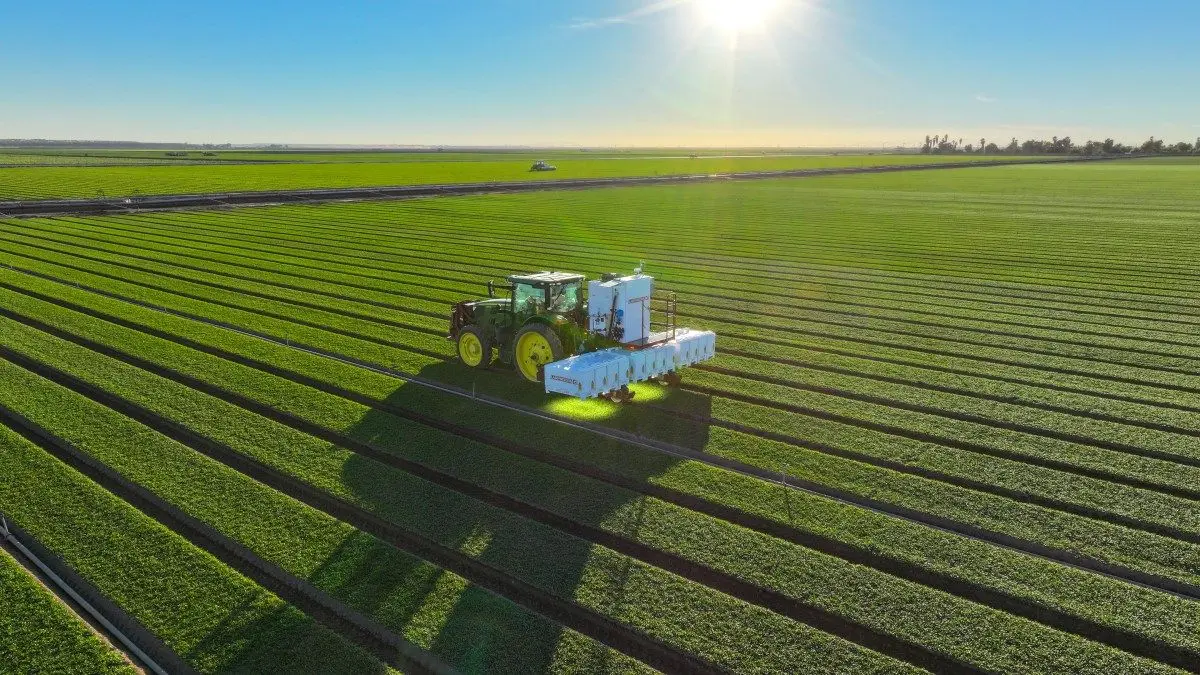Carbon Robotics Secures $70M for AI-Powered Farming Solutions
2 Sources
2 Sources
[1]
Carbon Robotics raises $70M to scale up AI-powered robotic farming solutions - SiliconANGLE
Carbon Robotics raises $70M to scale up AI-powered robotic farming solutions Artificial intelligence-powered farming robotics company Carbon Autonomous Robotics Systems Inc. today announced that it has raised $70 million in a late-stage funding to help scale up its business, introduce new software and hardware products and expand its manufacturing capabilities. Founded in 2018, Carbon Robotics offers AI-powered robotics solutions for farming that allow farmers to cut costs, increase production and boost profits. The company's main product, LaserWeeder, combines computer vision, AI deep learning, robotics and lasers to identify and eliminate weeds with millimeter accuracy. LaserWeeder can target weeds without disturbing crops, making it a highly efficient solution for organic and conventional farmers alike. The robotic weeder is designed to operate independently in large fields and can optimize weed control through 24-hour autonomous functionality that reduces labor needs and operational costs significantly for farmers. Beyond weed control, Carbon Robotics also offers a "LaserThinning" capability that allows farmers to optimize crop spacing by precisely thinning overseeded vegetable crops. The method improves growth and yield without the use of chemicals or manual labor and can be used alongside weeding in a single operation, making it ideal for maintaining crop health and boosting farm productivity. The company's technology operates autonomously and enhances productivity, reducing labor needs and input costs. Farmers also benefit from the ability to work day and night, unaffected by environmental conditions like wind or rain. The Series D round was led by BOND, with significant participation from NVentures, the venture capital arm of Nvidia Corp. Existing investors Anthos Capital LP, Fuse Venture Partners, Ignition Partners, Sozo Ventures Inc. and Voyager Capital LP also participated in the round. "Carbon Robotics is uniquely positioned to deploy AI to transform the massive agriculture industry at a critical time," said BOND General Partner Mood Rowghani. "Its proven ability to execute and scale, combined with a visionary leadership team, makes it a clear standout in the space." Including the new funding, Carbon Robotics has raised $157 million to date.
[2]
Future of farming? Carbon Robotics raises $70M for AI robots that blast weeds with lasers
Seattle startup Carbon Robotics raised $70 million in the latest vote of confidence from investors in the company's agriculture technology platform that helps farmers eliminate weeds without the use of herbicides. San Francisco firm BOND invested for the first time and led the Series D round, which also included Nvidia's venture capital arm. Carbon Robotics has raised $157 million since launching in 2018. The fresh cash will help scale its business, which has doubled revenue over the past 12 months. The company declined to provide specific revenue metrics. Carbon Robotics' "LaserWeeder" machine attaches to the back of a tractor and uses an array of AI-powered technology to detect plants in fields and then target and eliminate weeds with lasers, without disturbing the soil microbiology. Each machine relies on 24 Nvidia graphics processing units, processing 4.7 million high-resolution images per hour. "The brain of the machine is all software and advanced AI techniques," said Paul Mikesell, founder and CEO of Carbon Robotics. The company has also developed patented hardware mechanisms. The 20-foot machine helps farmers both eliminate herbicide-resistant weeds and stop using herbicides, which can be harmful to humans. The robots also take care of repetitive and dangerous work, according to Mikesell, allowing farmers to move their employees to other tasks. "There are a lot of jobs," he said, noting the farming labor shortage. "We're just getting rid of the worst ones to be doing." Mikesell is a longtime technologist and entrepreneur who previously co-founded data storage company Isilon Systems (which sold for $2.25 billion in 2010) and led an infrastructure engineering group at Uber for four years. "The real promise of AI is not going to be just large language models and ChatGPT," he said. "It's going to be, what does it actually do for your life?" Carbon Robotics stands out in an agriculture-tech industry that has seen venture capital funding decline by 60% since 2021, according to a report from McKinsey. Agtech startups have struggled to scale as they face adoption challenges with farmers, McKinsey said in a separate report. "While many companies are exploring speculative tech solutions in this space, Carbon Robotics has proven it can not only execute but also scale innovations that directly address farmers' needs," said Mood Rowghani, general partner at BOND who is joining the company's board. Mikesell said part of the startup's secret sauce is its focus on customer service and working closely with farmers. He said his team lived and worked from trailers on farms months at a time. "You can't just design and test these machines from the comfort of your office. You have to be out there in the fields," he said. "You've got to put in that time to really figure out what works and what doesn't work." Mikesell said other agtech companies have received bad advice from their investors to use a "robots-as-a-service" model, in which they lease out equipment and generate cash via recurring revenue, similar to traditional software-as-a-service. That "just does not work in agtech," he said. "I think that's where a lot of the problems come from, honestly -- people trying to map old school business models onto AI robotics and realizing it doesn't work until it's too late," Mikesell added. Investors laud the leadership and vision of Mikesell, who also founded database startup Clustrix in 2006 (acquired by MariaDB) and was a manager at Seattle-based RealNetworks from 1998 to 2001. He earned a computer science degree from the University of Washington. Erik Benson, managing director at Seattle-based Voyager Capital, called Mikesell a "once-in-a-generation talent who represents the good side of Tesla's Elon Musk." Mikesell spends "hundreds of days a year in the field with farmers compared to his competitors who sit in their ivory towers in Silicon Valley not wanting to get their hands dirty," Benson said via email. Benson said the company is the fastest growing startup he's seen in 26 years as a venture capitalist. Mikesell hinted that the company has plans to develop new robots for farms and beyond agriculture. "I want to see more AI robotics get out there into the world," he said. "I think it's coming, and I'm proud and happy to be at the forefront of that." Carbon Robotics did not disclose the price of the "LaserWeeder" but Mikesell said some farmers recoup the cost within a year based on savings from using the machine. He said agriculture banks are becoming familiar with Carbon Robotics and more willing to provide loans. The company also offers a software platform that gives details on weeds and crops in the field. Farmers pay an annual fee for service and customer support, along with regular software updates. Customers include farmers across the U.S., as well as in Europe and Australia. The fresh cash will help Carbon Robotics expand into Asia. Carbon is also opening a new 24,000 square-foot manufacturing plant in Richland, Wash., across the state from its corporate headquarters. Other investors in the latest round include Anthos Capital; FUSE, Ignition; Revolution; Sozo Ventures; and Voyager. "AI and robots and lasers and working with farmers," said Mikesell. "This is the best job in the world."
Share
Share
Copy Link
Carbon Robotics raises $70 million in Series D funding to scale up its AI-powered robotic farming solutions, including the LaserWeeder, which uses lasers to eliminate weeds without herbicides.

Carbon Robotics Secures $70M in Series D Funding
Carbon Autonomous Robotics Systems Inc., a Seattle-based startup, has successfully raised $70 million in a Series D funding round to advance its AI-powered robotic farming solutions
1
2
. This latest investment brings the company's total funding to $157 million since its inception in 2018, highlighting strong investor confidence in its innovative agricultural technology1
2
.Revolutionary LaserWeeder Technology
At the heart of Carbon Robotics' offering is the LaserWeeder, an AI-driven machine that combines computer vision, deep learning, robotics, and laser technology to identify and eliminate weeds with millimeter accuracy
1
. This 20-foot device, which attaches to the back of a tractor, processes an impressive 4.7 million high-resolution images per hour using 24 Nvidia graphics processing units2
.The LaserWeeder offers several advantages over traditional weed control methods:
- Precision targeting of weeds without disturbing crops or soil microbiology
- Elimination of herbicide-resistant weeds without using chemicals
- 24-hour autonomous operation, reducing labor needs and operational costs
- Ability to work in various environmental conditions, unaffected by wind or rain
1
Expanding Capabilities and Market Reach
Carbon Robotics is not limiting itself to weed control. The company has also developed a "LaserThinning" capability, allowing farmers to optimize crop spacing by precisely thinning overseeded vegetable crops
1
. This feature can be used alongside weeding in a single operation, further enhancing farm productivity.With the new funding, Carbon Robotics plans to:
- Scale up its business operations
- Introduce new software and hardware products
- Expand manufacturing capabilities
- Enter new markets, including Asia
1
2
Investor Confidence and Industry Impact
The Series D round was led by BOND, with significant participation from NVentures, Nvidia's venture capital arm. Existing investors, including Anthos Capital, Fuse Venture Partners, and others, also contributed
1
2
.Mood Rowghani, General Partner at BOND, expressed confidence in Carbon Robotics' potential to transform the agriculture industry, citing its "proven ability to execute and scale"
1
. This investment is particularly noteworthy given the recent 60% decline in venture capital funding for agtech startups since 20212
.Related Stories
Leadership and Vision
Paul Mikesell, founder and CEO of Carbon Robotics, brings a wealth of experience from previous successful ventures in data storage and infrastructure engineering
2
. Mikesell emphasizes the importance of working closely with farmers, stating, "You can't just design and test these machines from the comfort of your office. You have to be out there in the fields"2
.Future Prospects
Carbon Robotics is poised for continued growth, with plans to develop new robots for farms and potentially expand beyond agriculture
2
. The company is also opening a new 24,000 square-foot manufacturing plant in Richland, Washington2
.As AI and robotics continue to revolutionize farming practices, Carbon Robotics stands at the forefront of this technological transformation, offering solutions that not only increase efficiency but also promote sustainable agricultural practices.
References
Summarized by
Navi
[1]
Related Stories
Carbon Robotics unveils Large Plant Model trained on 150M+ plants to transform farming
03 Feb 2026•Technology

AI-Powered Solar Robots Revolutionize Farming: Aigen's Element Tackles Labor Shortages and Herbicide Resistance
06 Jul 2025•Technology

FieldAI Secures $405M Funding to Revolutionize Robotics with Universal AI Brains
21 Aug 2025•Technology

Recent Highlights
1
Elon Musk merges SpaceX with xAI, plans 1 million satellites to power orbital data centers
Business and Economy

2
French Police Raid X Office as Grok Investigation Expands to Include Holocaust Denial Claims
Policy and Regulation

3
UK launches formal probe into xAI as Grok continues generating sexualized images without consent
Policy and Regulation





